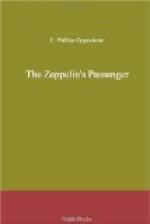“It seems incredible that we have talked so long,” Philippa said, glancing at the watch upon her wrist. “I really feel now that I know all about you—your school days, your college days, and your soldiering. You have been very frank, haven’t you?”
“I have nothing to conceal—from you,” he replied. “If there is anything more you want to know—”
“There is nothing,” she interrupted uneasily.
“Perhaps you are wise,” he reflected, “and yet some day, you know, you will have to hear it all, over and over again.”
“I will not be made love to in a restaurant,” she declared firmly.
“You are so particular as to localities,” he complained. “You could not see your way clear, I suppose, to suggest what you would consider a suitable environment?”
Philippa looked at him for a moment very earnestly.
“Ah, don’t let us play at things we neither of us feel!” she begged. “And there is some one there who wants to speak to you.”
Lessingham looked up into the face of the man who had paused before their table, as one might look into the face of unexpected death. He remained perfectly still, but the slight colour seemed slowly to be drawn from his cheeks. Yet the newcomer himself seemed in no way terrifying. He was tall and largely built, clean-shaven, and with the humourous mouth of an Irishman or an American. Neither was there anything threatening in his speech.
“Glad to run up against you, Lessingham,” he said, holding out his hand. “Gay crowd here tonight, isn’t it?”
“Very,” Lessingham answered, speaking very much like a man in a dream. “Lady Cranston, will you permit me to introduce my friend —Mr. Hayter.”
Philippa was immediately gracious, and a few moments passed in trivial conversation. Then Mr. Hayter prepared to depart.
“I must be joining my friends,” he observed. “Look in and see me sometime, Lessingham—Number 72, Milan Court. You know what a nightbird I am. Perhaps you will call and have a final drink with me when you have finished here.”
“I shall be very glad,” Lessingham promised.
Mr. Hayter passed on, a man, apparently, of many acquaintances, to judge by his interrupted progress. Lady Cranston looked at her companion. She was puzzled.
“Is that a recent acquaintance,” she asked, “as he addressed you by the name of Lessingham?”
“Yes,” was the quiet reply.
“You don’t wish to talk about him?”
“No!”
Helen and her partner returned, a few moments later, and the little party presently broke up. Lessingham drove the two women to their hotel in Dover Street.
“We’ve had a most delightful evening,” Philippa assured him, as they said good night. “You are coming round to see us in the morning, aren’t you?”
“If I may,” Lessingham assented.
Helen found her way into Philippa’s room, later on that night. She had nerved herself for a very thankless task.




